Skepticism, also spelled scepticism in British English, is a questioning attitude or doubt toward knowledge claims that are seen as mere belief or dogma. For example, if a person is skeptical about claims made by their government about an ongoing war then the person doubts that these claims are accurate. In such cases, skeptics normally recommend not disbelief but suspension of belief, i.e. maintaining a neutral attitude that neither affirms nor denies the claim. This attitude is often motivated by the impression that the available evidence is insufficient to support the claim. Formally, skepticism is a topic of interest in philosophy, particularly epistemology.
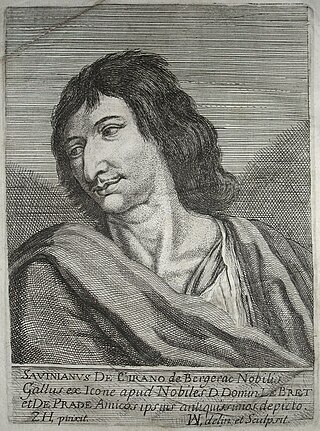
Savinien de Cyrano de Bergerac was a French novelist, playwright, epistolarian, and duelist.

Auguste-Charles-Joseph de Flahaut de La Billarderie, comte de Flahaut was a French general during the Napoleonic Wars, a Senator, and later in his life, a French Ambassador to the Court of St James's. He had a son with Napoleon's stepdaughter, Queen Hortense de Beauharnais, daughter of Josephine.
Philosophical skepticism is a family of philosophical views that question the possibility of knowledge. It differs from other forms of skepticism in that it even rejects very plausible knowledge claims that belong to basic common sense. Philosophical skeptics are often classified into two general categories: Those who deny all possibility of knowledge, and those who advocate for the suspension of judgment due to the inadequacy of evidence. This distinction is modeled after the differences between the Academic skeptics and the Pyrrhonian skeptics in ancient Greek philosophy. In the latter sense, skepticism is understood as a way of life that helps the practitioner achieve inner peace. Some types of philosophical skepticism reject all forms of knowledge while others limit this rejection to certain fields, for example, to knowledge about moral doctrines or about the external world. Some theorists criticize philosophical skepticism based on the claim that it is a self-refuting idea since its proponents seem to claim to know that there is no knowledge. Other objections focus on its implausibility and distance from regular life.

Scientific skepticism or rational skepticism, sometimes referred to as skeptical inquiry, is a position in which one questions the veracity of claims lacking empirical evidence. In practice, the term most commonly references the examination of claims and theories that appear to be beyond mainstream science, rather than the routine discussions and challenges among scientists. Scientific skepticism differs from philosophical skepticism, which questions humans' ability to claim any knowledge about the nature of the world and how they perceive it, and the similar but distinct methodological skepticism, which is a systematic process of being skeptical about the truth of one's beliefs.

Pierre Ambroise François Choderlos de Laclos was a French novelist, official, Freemason and army general, best known for writing the epistolary novel Les Liaisons dangereuses (1782).

Iraq – Its Infrastructure of Concealment, Deception and Intimidation was a 2003 briefing document for the British prime minister Tony Blair's Labour Party government. It was issued to journalists on 3 February 2003 by Alastair Campbell, Blair's Director of Communications and Strategy, and concerned Iraq and weapons of mass destruction. Along with the earlier September Dossier, these documents were ultimately used by the British government to justify its involvement in the invasion of Iraq in 2003.

Émile de Girardin was a French journalist, publisher and politician. He was the most successful and flamboyant French journalist of the era, presenting himself as a promoter of mass education through mass journalism. His magazines reached over a hundred thousand subscribers, and his inexpensive daily newspaper La Presse undersold the competition by half, thanks to its cheaper production and heavier advertising. Like most prominent journalists, Girardin was deeply involved in politics, and served in parliament. To his bitter disappointment, he never held high office. He was a brilliant polemicist, a master of controversy, with pungent short sentences that immediately caught the reader's attention.
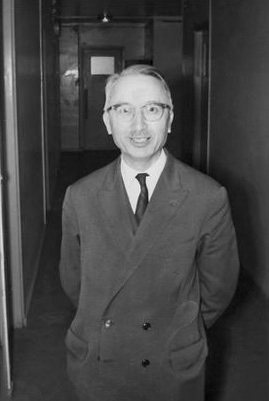
Henri Paul Cartan was a French mathematician who made substantial contributions to algebraic topology.

Jean Graton was a French comic book author and cartoonist. Graton created the character Michel Vaillant and the eponymous series in 1957.

Jacques Roumain was a Haitian writer, politician, and advocate of Marxism. He is considered one of the most prominent figures in Haitian literature. Poet Langston Hughes, an African-American, translated some of Roumain's works, including Gouverneurs de la Rosée. It was also adapted to film.
Religious skepticism is a type of skepticism relating to religion. Religious skeptics question religious authority and are not necessarily anti-religious but rather are skeptical of either specific or all religious beliefs and/or practices. Socrates was one of the most prominent and first religious skeptics of whom there are records; he questioned the legitimacy of the beliefs of his time in the existence of the Greek gods. Religious skepticism is not the same as atheism or agnosticism, and some religious skeptics are deists.

Rembrandt Harmenszoon van Rijn, usually simply known as Rembrandt, was a Dutch Golden Age painter, printmaker, and draughtsman. An innovative and prolific master in three media, he is generally considered one of the greatest visual artists in the history of art. It is estimated Rembrandt produced a total of about three hundred paintings, three hundred etchings, and two thousand drawings.
Nuno Oliveira was a Portuguese equestrian, horse trainer and dressage instructor. His teachings have inspired riders and trainers all over the world to adopt the 'baroque' or 'classical' style of working with the horse; an art which goes back hundreds of years and encompasses the fundamentals which most 'modern' disciplines can be traced back to.
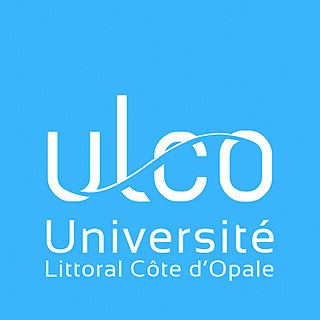
The University of the Littoral Opal Coast is a public university located in the Nord and Pas-de-Calais departments of northern France. Its namesake is the Opal Coast region, of which it is a part.
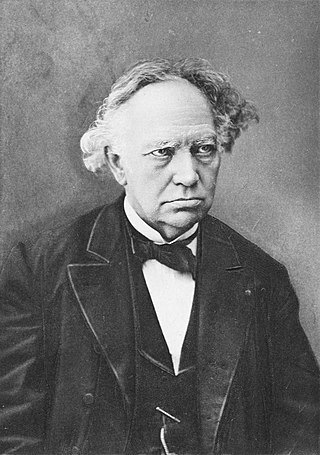
Charles Hermite FRS FRSE MIAS was a French mathematician who did research concerning number theory, quadratic forms, invariant theory, orthogonal polynomials, elliptic functions, and algebra.

Serge Monast was a Canadian investigative journalist, poet, essayist and conspiracy theorist. He is known to English-speaking readers mainly for the originating the conspiracy theory Project Blue Beam, which concerns an alleged plot to facilitate a totalitarian world government by destroying traditional religions and replacing them with a new-age belief system using NASA technology.

The Observatoire Zététique or OZ is a French skeptical nonprofit organisation founded in 2003, headquartered in Grenoble. It is a member of the European Council of Skeptical Organisations (ECSO).
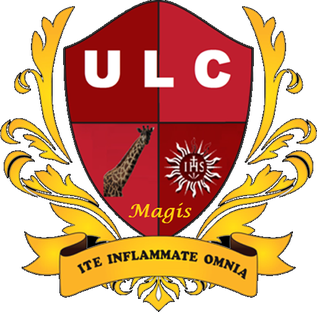
Loyola University of Congo, also referred to by its acronym ULC, is a private Roman Catholic higher education institution run by the Central Africa Province of the Society of Jesus in Kinshasa, the capital city of the Democratic Republic of Congo. It was founded by the Jesuits in 2016. The Jesuits have pursued educational efforts in Kinshasa since 1954, and have named the university after the founder of the Jesuits, Ignatius of Loyola.















